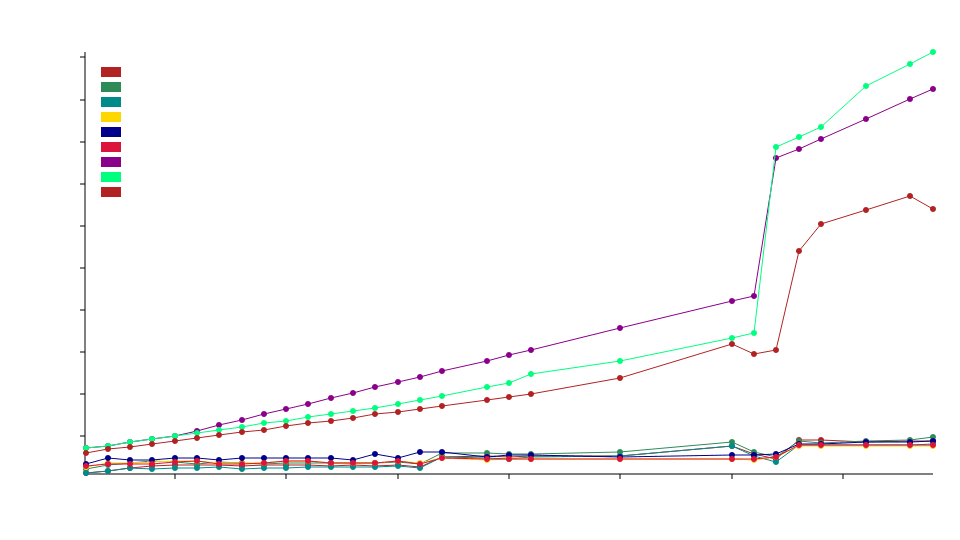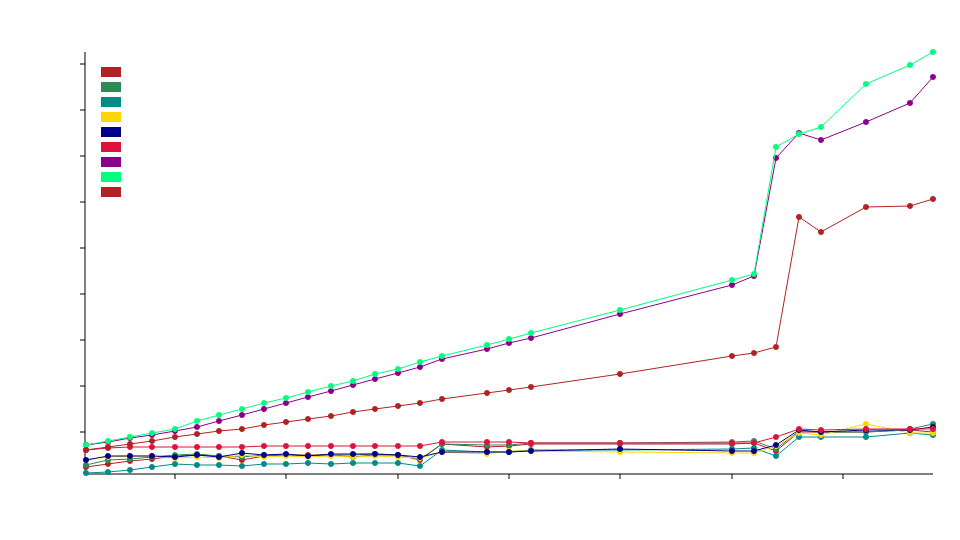37 releases
| 0.16.0 | May 27, 2024 |
|---|---|
| 0.15.6 | Dec 31, 2023 |
| 0.15.5 | Nov 28, 2023 |
| 0.14.2 | Jul 27, 2023 |
| 0.0.3 | Feb 23, 2022 |
#104 in Parser implementations
131,061 downloads per month
Used in 364 crates
(10 directly)
125KB
2.5K
SLoC
Rust fast &[u8] to integer parser
SIMD (fast) parsing is supported on x86_64 (SSE4.1, AVX2) and on Arm64 (aarch64, Neon), but this library works even if you don't have a SIMD supported cpu (and it will be still faster than str::parse).
Supports negative values and validates the input.
Supported output types: u8, i8, u16, i16, u32, i32, u64, i64, u128, i128, usize, isize.
Has good test coverage, and can be considered safe.
To enable SIMD it needs the target-feature or target-cpu flags set, or it will fallback to non-SIMD functions.
You can copy the ./.cargo/config.toml to your project, or use one of the following environment variables:
-
RUSTFLAGS="-C target-feature=+sse2,+sse3,+sse4.1,+ssse3,+avx,+avx2"for x86_64 -
RUSTFLAGS="-C target-feature=+neon"for Arm64 -
RUSTFLAGS="-C target-cpu=native"will optimize for your current cpu
For Windows PowerShell you can set it with $Env:RUSTFLAGS='-C target-feature=+sse2,+sse3,+sse4.1,+ssse3,+avx,+avx2'
By default the target-feature is set in ./.cargo/config.toml, but seems like it works only inside this project.
If you have &str then use .as_bytes()
Supports no_std with --no-default-features
Got the idea from here (source).
Examples
let val: u64 = atoi_simd::parse(b"1234").unwrap();
assert_eq!(val, 1234_u64);
assert_eq!(atoi_simd::parse::<i64>(b"-2345"), Ok(-2345_i64));
assert_eq!(atoi_simd::parse_any::<u64>(b"123something_else"), Ok((123_u64, 3)));
// a drop-in replacement for `str::parse`
assert_eq!(atoi_simd::parse_skipped::<u64>(b"+000000000000000000001234"), Ok(1234_u64));
Benchmarks
You can run cargo bench from bench folder on your machine (or individually with cargo bench -- "parse u64")
Results
More information you can find here.
v0.16.0
Rust 1.78, Windows 10, Intel i7 9700K, "target-feature" set
parse::<u64>()
str::parse::<u64>()
parse::<i64>()
str::parse::<i64>()
parse::<u128>()
str::parse::<u128>()
parse::<i128>()
str::parse::<i128>()
v0.15.2
Rust 1.73, Windows 10, Intel i7 9700K, "target-feature" set
parse::<u64>()
str::parse::<u64>()
parse::<i64>()
str::parse::<i64>()
parse::<u128>()
str::parse::<u128>()
parse::<i128>()
str::parse::<i128>()
v0.14.5
Rust 1.72, Windows 10, Intel i7 9700K, "target-feature" set
parse::<u64>()
str::parse::<u64>()
parse::<i64>()
str::parse::<i64>()
parse::<u128>()
str::parse::<u128>()
parse::<i128>()
str::parse::<i128>()
v0.14.4
Rust 1.72, Windows 10, Intel i7 9700K, "target-feature" set
parse::<u64>()
str::parse::<u64>()
parse::<i64>()
str::parse::<i64>()
parse::<u128>()
str::parse::<u128>()
parse::<i128>()
str::parse::<i128>()
v0.10.1
Rust 1.67.1, Windows 10, Intel i7 9700K, "target-feature" set
parse::<u64>()
str::parse::<u64>()
parse::<i64>()
str::parse::<i64>()
parse::<u128>()
str::parse::<u128>()
parse::<i128>()
str::parse::<i128>()
v0.4-v0.5
Rust 1.63, Windows 10, Intel i7 9700K, "target-feature" set
parse_u64()
str::parse::<u64>()
parse_i64()
str::parse::<i64>()
parse_u128()
str::parse::<u128>()
parse_i128()
str::parse::<i128>()
v0.3.0
Rust 1.63, Windows 10, Intel i7 9700K, "target-feature" set
parse() u64
str::parse::<u64>()
parse_i64()
str::parse::<i64>()
parse_u128()
str::parse::<u128>()
parse_i128()
str::parse::<i128>()
v0.2.1
Rust 1.63, Windows 10, Intel i7 9700K, "target-feature" set
parse() u64
str::parse::<u64>()
parse_i64()
str::parse::<i64>()
parse_u128()
str::parse::<u128>()
parse_i128()
str::parse::<i128>()
v0.2.0
Rust 1.63, Windows 10, Intel i7 9700K, "target-feature" set
parse() u64
str::parse::<u64>()
parse_i64()
str::parse::<i64>()
parse_u128()
str::parse::<u128>()
parse_i128()
str::parse::<i128>()
v0.1.x
What was noticed
- It's around 7 times faster than the standard parse (for long string, Rust 1.60)
- The performance is constant (the same) for strings of different lengths
Rust 1.63, Windows 10, Intel i7 9700K, "target-feature" set
This one became faster on Rust 1.63:
long string std u64 1234567890123456
time: [9.0293 ns 9.0843 ns 9.1661 ns]
change: [-0.6548% +0.8424% +2.3425%] (p = 0.29 > 0.05)
No change in performance detected.
Found 8 outliers among 100 measurements (8.00%)
2 (2.00%) high mild
6 (6.00%) high severe
This one became even slover. I reran it (with rebuild) multiple times - same result:
long string negative std i64 -1234567890123456
time: [17.554 ns 17.607 ns 17.667 ns]
change: [-1.6112% -0.2132% +1.5620%] (p = 0.80 > 0.05)
No change in performance detected.
Found 6 outliers among 100 measurements (6.00%)
3 (3.00%) high mild
3 (3.00%) high severe
long string u64 1234567890123456
time: [1.9273 ns 1.9346 ns 1.9424 ns]
change: [-2.3999% -0.4986% +1.2253%] (p = 0.62 > 0.05)
No change in performance detected.
Found 5 outliers among 100 measurements (5.00%)
2 (2.00%) high mild
3 (3.00%) high severe
long string i64 1234567890123456
time: [2.3258 ns 2.3357 ns 2.3468 ns]
change: [-2.1695% -0.4296% +1.3102%] (p = 0.65 > 0.05)
No change in performance detected.
Found 6 outliers among 100 measurements (6.00%)
1 (1.00%) high mild
5 (5.00%) high severe
long string negative i64 -1234567890123456
time: [2.5319 ns 2.5439 ns 2.5607 ns]
change: [-2.0344% -0.3167% +1.5650%] (p = 0.75 > 0.05)
No change in performance detected.
Found 8 outliers among 100 measurements (8.00%)
1 (1.00%) high mild
7 (7.00%) high severe
short string std u64 1
time: [2.3305 ns 2.3462 ns 2.3656 ns]
change: [-4.1262% -1.9850% +0.2412%] (p = 0.07 > 0.05)
No change in performance detected.
Found 7 outliers among 100 measurements (7.00%)
1 (1.00%) high mild
6 (6.00%) high severe
short string negative std i64 -1
time: [3.7983 ns 3.8177 ns 3.8402 ns]
change: [-1.4979% -0.0694% +1.5137%] (p = 0.94 > 0.05)
No change in performance detected.
Found 9 outliers among 100 measurements (9.00%)
5 (5.00%) high mild
4 (4.00%) high severe
short string u64 1
time: [2.0024 ns 2.0097 ns 2.0184 ns]
change: [-3.4351% -1.3017% +0.5198%] (p = 0.22 > 0.05)
No change in performance detected.
Found 3 outliers among 100 measurements (3.00%)
1 (1.00%) high mild
2 (2.00%) high severe
short string i64 1
time: [2.4245 ns 2.4356 ns 2.4499 ns]
change: [-2.9298% -1.3203% +0.3535%] (p = 0.12 > 0.05)
No change in performance detected.
Found 9 outliers among 100 measurements (9.00%)
3 (3.00%) high mild
6 (6.00%) high severe
short string negative i64 -1
time: [2.5191 ns 2.5233 ns 2.5285 ns]
change: [-2.8014% -0.9235% +0.7916%] (p = 0.35 > 0.05)
No change in performance detected.
Found 8 outliers among 100 measurements (8.00%)
2 (2.00%) high mild
6 (6.00%) high severe
Bonus 15 chars benchmarks:
15 chars string std u64 123456789012345
time: [8.4146 ns 8.4352 ns 8.4604 ns]
change: [-2.5855% -1.0348% +0.5767%] (p = 0.21 > 0.05)
No change in performance detected.
Found 7 outliers among 100 measurements (7.00%)
2 (2.00%) high mild
5 (5.00%) high severe
15 chars string negative std i64 -123456789012345
time: [10.268 ns 10.331 ns 10.415 ns]
change: [-0.7653% +0.9929% +2.7733%] (p = 0.30 > 0.05)
No change in performance detected.
Found 13 outliers among 100 measurements (13.00%)
7 (7.00%) high mild
6 (6.00%) high severe
15 chars string u64 123456789012345
time: [1.8990 ns 1.9042 ns 1.9103 ns]
change: [-1.8510% -0.3256% +0.9332%] (p = 0.70 > 0.05)
No change in performance detected.
Found 6 outliers among 100 measurements (6.00%)
2 (2.00%) high mild
4 (4.00%) high severe
15 chars string i64 123456789012345
time: [2.3780 ns 2.3831 ns 2.3892 ns]
change: [-2.1490% -0.6463% +0.8095%] (p = 0.41 > 0.05)
No change in performance detected.
Found 9 outliers among 100 measurements (9.00%)
5 (5.00%) high mild
4 (4.00%) high severe
15 chars string negative i64 -123456789012345
time: [2.5323 ns 2.5445 ns 2.5589 ns]
change: [-2.8686% -0.9755% +0.9693%] (p = 0.34 > 0.05)
No change in performance detected.
Found 7 outliers among 100 measurements (7.00%)
2 (2.00%) high mild
5 (5.00%) high severe
Rust 1.60, Windows 10, Intel i7 9700K, "target-feature" set
long string std u64 1234567890123456
time: [15.136 ns 15.172 ns 15.220 ns]
change: [-1.0266% +1.4318% +4.7776%] (p = 0.42 > 0.05)
No change in performance detected.
Found 14 outliers among 100 measurements (14.00%)
1 (1.00%) low severe
1 (1.00%) low mild
3 (3.00%) high mild
9 (9.00%) high severe
When parsing to i64 (standard .parse::<i64>()) it's somehow faster rather then u64 (.parse::<u64>())
long string negative std i64 -1234567890123456
time: [12.451 ns 12.468 ns 12.489 ns]
change: [-2.8201% -1.8197% -0.9578%] (p = 0.00 < 0.05)
Change within noise threshold.
Found 15 outliers among 100 measurements (15.00%)
2 (2.00%) low mild
5 (5.00%) high mild
8 (8.00%) high severe
long string u64 1234567890123456
time: [2.1173 ns 2.1212 ns 2.1254 ns]
change: [-1.7643% -0.7705% +0.0464%] (p = 0.11 > 0.05)
No change in performance detected.
Found 3 outliers among 100 measurements (3.00%)
3 (3.00%) high severe
long string i64 1234567890123456
time: [2.0971 ns 2.1018 ns 2.1083 ns]
change: [-1.4917% -0.3822% +0.4114%] (p = 0.53 > 0.05)
No change in performance detected.
Found 16 outliers among 100 measurements (16.00%)
3 (3.00%) low mild
5 (5.00%) high mild
8 (8.00%) high severe
long string negative i64 -1234567890123456
time: [2.1659 ns 2.1689 ns 2.1729 ns]
change: [-1.8464% -0.6673% +0.2406%] (p = 0.25 > 0.05)
No change in performance detected.
Found 12 outliers among 100 measurements (12.00%)
4 (4.00%) low mild
1 (1.00%) high mild
7 (7.00%) high severe
short string std u64 1
time: [2.7282 ns 2.7315 ns 2.7355 ns]
change: [-0.3423% +0.5560% +1.4297%] (p = 0.25 > 0.05)
No change in performance detected.
Found 16 outliers among 100 measurements (16.00%)
6 (6.00%) high mild
10 (10.00%) high severe
short string negative std i64 -1
time: [3.4122 ns 3.4210 ns 3.4304 ns]
change: [-0.4427% +0.2415% +1.0592%] (p = 0.57 > 0.05)
No change in performance detected.
Found 4 outliers among 100 measurements (4.00%)
1 (1.00%) high mild
3 (3.00%) high severe
short string u64 1
time: [2.0971 ns 2.0989 ns 2.1014 ns]
change: [-0.4568% +0.1569% +0.7932%] (p = 0.63 > 0.05)
No change in performance detected.
Found 16 outliers among 100 measurements (16.00%)
2 (2.00%) low mild
2 (2.00%) high mild
12 (12.00%) high severe
This one must be a little lower, around 2.3 ns
short string i64 1
time: [2.6629 ns 2.6704 ns 2.6789 ns]
change: [-0.2341% +0.4340% +0.9879%] (p = 0.19 > 0.05)
No change in performance detected.
Found 6 outliers among 100 measurements (6.00%)
2 (2.00%) high mild
4 (4.00%) high severe
short string negative i64 -1
time: [2.3049 ns 2.3077 ns 2.3115 ns]
change: [-0.8049% -0.1058% +0.5989%] (p = 0.79 > 0.05)
No change in performance detected.
Found 16 outliers among 100 measurements (16.00%)
5 (5.00%) low mild
3 (3.00%) high mild
8 (8.00%) high severe
Bonus 15 chars benchmarks:
15 chars string std u64 123456789012345
time: [14.314 ns 14.347 ns 14.386 ns]
change: [+0.5781% +1.5775% +3.0108%] (p = 0.00 < 0.05)
Change within noise threshold.
Found 10 outliers among 100 measurements (10.00%)
7 (7.00%) high mild
3 (3.00%) high severe
15 chars string negative std i64 -123456789012345
time: [11.797 ns 11.869 ns 11.952 ns]
change: [-2.0623% -0.8216% +0.4470%] (p = 0.21 > 0.05)
No change in performance detected.
Found 11 outliers among 100 measurements (11.00%)
3 (3.00%) high mild
8 (8.00%) high severe
15 chars string u64 123456789012345
time: [1.8545 ns 1.8559 ns 1.8576 ns]
change: [-1.0279% -0.3076% +0.3114%] (p = 0.40 > 0.05)
No change in performance detected.
Found 16 outliers among 100 measurements (16.00%)
3 (3.00%) low mild
4 (4.00%) high mild
9 (9.00%) high severe
15 chars string i64 123456789012345
time: [2.3638 ns 2.3734 ns 2.3825 ns]
change: [-1.8528% -0.7356% +0.2488%] (p = 0.17 > 0.05)
No change in performance detected.
Found 4 outliers among 100 measurements (4.00%)
3 (3.00%) high mild
1 (1.00%) high severe
15 chars string negative i64 -123456789012345
time: [2.3077 ns 2.3109 ns 2.3152 ns]
change: [-1.9844% -1.2570% -0.5860%] (p = 0.00 < 0.05)
Change within noise threshold.
Found 15 outliers among 100 measurements (15.00%)
3 (3.00%) low mild
2 (2.00%) high mild
10 (10.00%) high severe






















































































